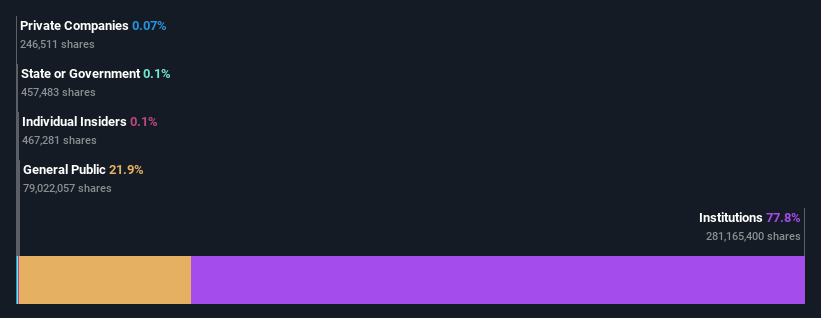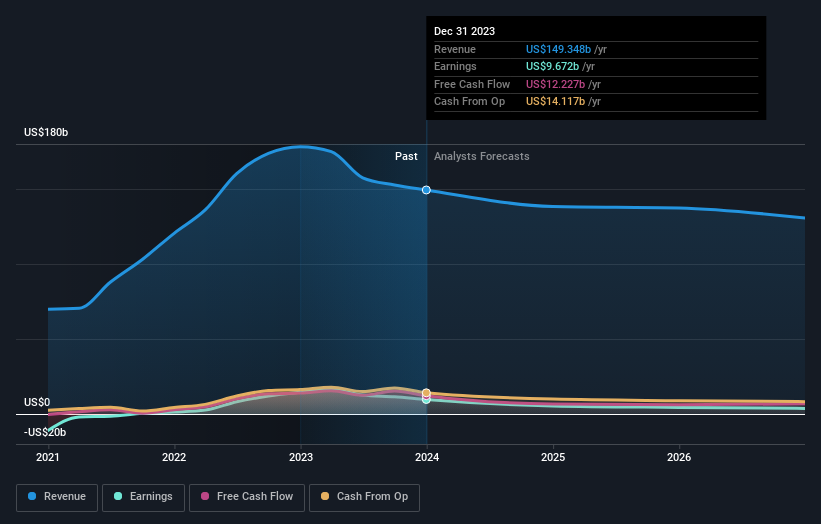Institutional investors control 78% of Marathon Petroleum Corporation (NYSE:MPC) and were rewarded last week after stock increased 4.8%
Key Insights
Significantly high institutional ownership implies Marathon Petroleum's stock price is sensitive to their trading actions
The top 25 shareholders own 50% of the company
If you want to know who really controls Marathon Petroleum Corporation (NYSE:MPC), then you'll have to look at the makeup of its share registry. We can see that institutions own the lion's share in the company with 78% ownership. In other words, the group stands to gain the most (or lose the most) from their investment into the company.
And last week, institutional investors ended up benefitting the most after the company hit US$63b in market cap. The gains from last week would have further boosted the one-year return to shareholders which currently stand at 40%.
In the chart below, we zoom in on the different ownership groups of Marathon Petroleum.
View our latest analysis for Marathon Petroleum
What Does The Institutional Ownership Tell Us About Marathon Petroleum?
Institutions typically measure themselves against a benchmark when reporting to their own investors, so they often become more enthusiastic about a stock once it's included in a major index. We would expect most companies to have some institutions on the register, especially if they are growing.
Marathon Petroleum already has institutions on the share registry. Indeed, they own a respectable stake in the company. This can indicate that the company has a certain degree of credibility in the investment community. However, it is best to be wary of relying on the supposed validation that comes with institutional investors. They too, get it wrong sometimes. When multiple institutions own a stock, there's always a risk that they are in a 'crowded trade'. When such a trade goes wrong, multiple parties may compete to sell stock fast. This risk is higher in a company without a history of growth. You can see Marathon Petroleum's historic earnings and revenue below, but keep in mind there's always more to the story.
Since institutional investors own more than half the issued stock, the board will likely have to pay attention to their preferences. We note that hedge funds don't have a meaningful investment in Marathon Petroleum. Looking at our data, we can see that the largest shareholder is The Vanguard Group, Inc. with 9.9% of shares outstanding. For context, the second largest shareholder holds about 8.6% of the shares outstanding, followed by an ownership of 6.9% by the third-largest shareholder.
On studying our ownership data, we found that 25 of the top shareholders collectively own less than 50% of the share register, implying that no single individual has a majority interest.
While studying institutional ownership for a company can add value to your research, it is also a good practice to research analyst recommendations to get a deeper understand of a stock's expected performance. There are a reasonable number of analysts covering the stock, so it might be useful to find out their aggregate view on the future.
Insider Ownership Of Marathon Petroleum
The definition of an insider can differ slightly between different countries, but members of the board of directors always count. The company management answer to the board and the latter should represent the interests of shareholders. Notably, sometimes top-level managers are on the board themselves.
I generally consider insider ownership to be a good thing. However, on some occasions it makes it more difficult for other shareholders to hold the board accountable for decisions.
Our data suggests that insiders own under 1% of Marathon Petroleum Corporation in their own names. Being so large, we would not expect insiders to own a large proportion of the stock. Collectively, they own US$82m of stock. It is good to see board members owning shares, but it might be worth checking if those insiders have been buying.
General Public Ownership
With a 22% ownership, the general public, mostly comprising of individual investors, have some degree of sway over Marathon Petroleum. This size of ownership, while considerable, may not be enough to change company policy if the decision is not in sync with other large shareholders.
Next Steps:
I find it very interesting to look at who exactly owns a company. But to truly gain insight, we need to consider other information, too. Case in point: We've spotted 3 warning signs for Marathon Petroleum you should be aware of, and 1 of them is concerning.
But ultimately it is the future, not the past, that will determine how well the owners of this business will do. Therefore we think it advisable to take a look at this free report showing whether analysts are predicting a brighter future.
NB: Figures in this article are calculated using data from the last twelve months, which refer to the 12-month period ending on the last date of the month the financial statement is dated. This may not be consistent with full year annual report figures.
Have feedback on this article? Concerned about the content? Get in touch with us directly. Alternatively, email editorial-team (at) simplywallst.com.
This article by Simply Wall St is general in nature. We provide commentary based on historical data and analyst forecasts only using an unbiased methodology and our articles are not intended to be financial advice. It does not constitute a recommendation to buy or sell any stock, and does not take account of your objectives, or your financial situation. We aim to bring you long-term focused analysis driven by fundamental data. Note that our analysis may not factor in the latest price-sensitive company announcements or qualitative material. Simply Wall St has no position in any stocks mentioned.


